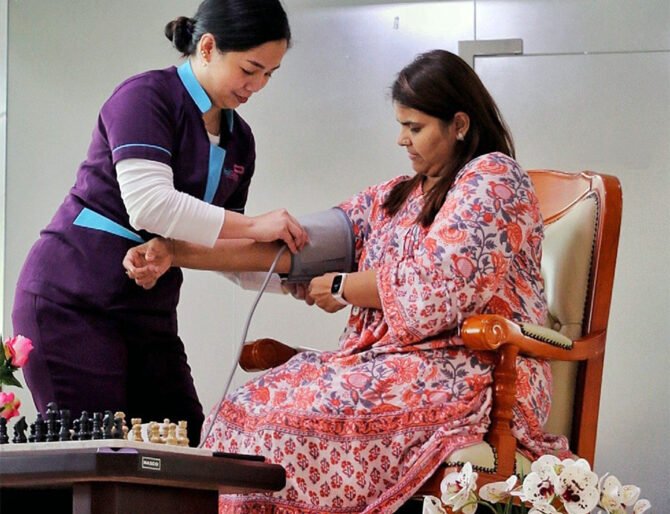Recovering from surgery can be a challenging time, often requiring a period of rest and rehabilitation. While many people opt to stay in the hospital for recovery, an increasing number of patients are choosing to continue their post-surgery care at home. Post-surgery care at home (الرعاية بعد الجراحة في المنزل) offers numerous advantages, from enhanced comfort to personalized attention. In this comprehensive guide, we will explore the top benefits and why it might be the right option for you or your loved one.
What is Post-Surgery Care at Home?
Post-surgery care at home refers to the medical assistance provided to patients after they undergo surgical procedures. This care typically involves a team of healthcare professionals, including nurses, therapists, and home care aides, who work together to ensure the patient’s recovery is smooth and effective. The services offered may include wound care, medication management, physical therapy, vital sign monitoring, and help with daily activities like bathing or meal preparation.
Always allows patients to recuperate in a familiar, comfortable environment, which can speed up their recovery process while minimizing hospital readmissions or complications.
Top Benefits of Post-Surgery Care at Home
Comfort and Familiarity
One of the most significant advantages of recovering at home is the comfort and familiarity of your own environment. Being in a hospital, with its clinical setting and strict routines, can sometimes feel overwhelming. In contrast, being at home allows patients to relax in a familiar, personalized space, which can help reduce stress and anxiety during recovery.
Additionally, being at home often leads to better mental and emotional well-being. Patients can engage with loved ones, watch their favorite shows, and follow their regular routines, all of which contribute to a sense of normalcy and security during the recovery process.
Personalized Care
Post-surgery care at home provides a higher level of personalized care compared to a hospital setting. In a hospital, nurses and medical staff often have to manage multiple patients, whereas home care nurses focus solely on the patient’s needs during their scheduled visits. This individualized attention ensures that the patient’s recovery is managed with the highest level of care.
Home nurses can tailor the care plan based on the patient’s specific surgery, health condition, and recovery goals. Whether the patient needs help with wound care, administering medications, or physical therapy, the care provided will be customized to meet those needs effectively.
Reduced Risk of Hospital-Acquired Infections
Hospitals are high-risk environments where patients can easily contract infections due to the presence of bacteria and viruses. This is especially concerning for patients with compromised immune systems or those recovering from surgery. By choosing patients are in a more controlled, sterile environment, reducing the risk of hospital-acquired infections (HAIs).
In home care, medical professionals follow strict hygiene and infection control protocols, ensuring the patient is safe from external contaminants. As a result, the recovery process is smoother and less prone to complications.
Faster Recovery and Increased Independence
Recovering in the comfort of your home can have a positive impact on the speed of recovery. Studies show that patients who recover at home often experience faster healing than those who stay in the hospital. The absence of hospital stressors and the ability to rest in a quiet, comfortable environment can promote better sleep and faster recovery times.
Moreover, post-surgery care at home allows for a more gradual and manageable return to normal activities. Home care providers assist patients with rehabilitation and mobility exercises, enabling them to regain strength and independence more quickly.
Cost-Effective Solution
Hospital stays can be expensive, with costs for room charges, medications, and specialized treatments adding up quickly. Post-surgery care at home offers a more cost-effective alternative. Patients can receive the same level of care without the high costs associated with hospital stays.
In addition to reduced room fees, patients only pay for the services they require at home, whether it’s medication management, wound care, or physical therapy. This can significantly reduce overall healthcare expenses, especially for long-term recovery processes.
Continuous Monitoring and Immediate Response
Post-surgery care at home provides continuous monitoring of vital signs and immediate responses to any changes in the patient’s condition. Nurses can track key indicators such as blood pressure, heart rate, oxygen levels, and temperature. If any concerning issues arise, the nurse can alert the physician immediately, preventing complications and ensuring timely medical intervention if needed.
This continuous care and monitoring often result in better outcomes and fewer post-surgical complications compared to less frequent visits in a hospital.
Better Sleep and Rest
In a hospital, interruptions like frequent checks, loud noises, and bright lights can disturb a patient’s sleep, affecting the healing process. At home, however, patients can enjoy a peaceful environment with minimal interruptions, which is essential for effective recovery. Proper sleep helps the body heal and reduces stress levels, both of which contribute to a quicker recovery.
Emotional Support from Family and Friends
One of the most powerful benefits of recovering at home is the emotional support patients receive from their loved ones. Being surrounded by family and friends during recovery can improve a patient’s mental health, increase motivation, and provide comfort in challenging times.
Having loved ones nearby also allows them to participate in the care process, such as assisting with daily activities, encouraging mobility exercises, or simply offering companionship during recovery.
Types of Post-Surgery Care Services Available at Home
Wound Care
Proper wound care is crucial to prevent infection and ensure proper healing after surgery. Home nurses can clean, dress, and monitor surgical wounds, ensuring they heal without complications. They also provide advice on how to manage wounds and reduce the risk of infection.
Medication Management
Taking the correct medications on time is essential to avoid complications during recovery. Post-surgery care at home includes medication management, where nurses ensure that medications are taken as prescribed. They can also help with administering injections or managing intravenous (IV) fluids if necessary.
Physical Therapy
Physical therapy is often a crucial part of post-surgery recovery. A physical therapist can visit the home to assist the patient with exercises that help improve mobility, strength, and flexibility. These exercises are personalized to the patient’s surgery and recovery progress.
Nutritional Support
Nutrition plays a critical role in recovery. Home care nurses or dieticians can assist patients with meal planning, ensuring they receive the proper nutrients needed for healing. This may include high-protein meals, vitamins, or supplements that help improve recovery times.
Emotional and Psychological Support
Undergoing surgery can be a stressful experience, and the road to recovery can sometimes be emotionally challenging. Home care nurses can provide emotional support, helping patients stay positive and engaged throughout the recovery process. Some services also include psychological counseling to assist with the emotional hurdles of post-surgery recovery.
FAQs About Post-Surgery Care at Home
Is post-surgery care at home covered by insurance?
Many insurance providers offer coverage for post-surgery care at home, but this can vary depending on the type of surgery, the patient’s health plan, and the services required. It is important to check with your insurance provider to understand what is covered under your policy.
How do I arrange post-surgery care at home?
To arrange post-surgery care at home, you can contact a licensed home care agency that provides nursing services. The agency will assess your needs and match you with appropriate healthcare professionals. You can also discuss post-surgery care with your doctor or surgeon, who may recommend home care providers.
Can post-surgery care at home be customized to my needs?
Yes, this is highly customizable. Nurses and healthcare providers develop a care plan tailored to the patient’s specific surgery, health condition, and recovery goals. This ensures that the care provided is appropriate for the patient’s unique needs.
What types of surgeries require post-surgery care at home?
Post-surgery care at home can be beneficial after a wide range of surgeries, including orthopedic surgeries (like joint replacements), abdominal surgeries, heart surgeries, and surgeries related to cancer treatment. Patients recovering from less invasive procedures may also benefit from home care services, particularly if they need assistance with mobility, wound care, or rehabilitation.
How long will I need post-surgery care at home?
The duration of post-surgery care depends on the type of surgery, the patient’s health condition, and the recovery progress. Some patients may only require a few weeks of care, while others might need long-term support for several months. Your healthcare provider will help determine how long care is necessary.
Conclusion
Post-surgery care at home offers a host of benefits that can make the recovery process smoother, faster, and more comfortable. With the comfort of familiar surroundings, personalized attention, and the convenience of avoiding hospital visits, home care after surgery is becoming an increasingly popular option. Whether you are recovering from a major surgery or a minor procedure,allows for a more relaxed, efficient, and cost-effective healing experience. If you or your loved one is undergoing surgery, consider the advantages of to ensure the best recovery outcome.















Leave a Reply